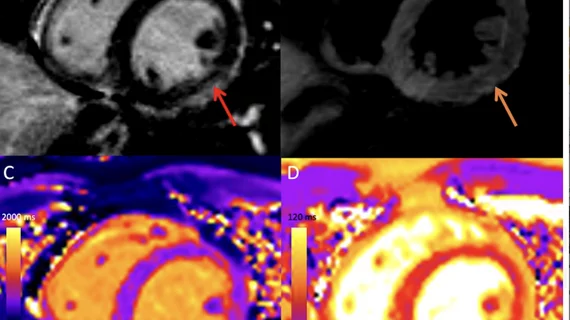Cardiac MRI sheds new light on vaccine-related myocarditis
COVID-19 vaccine-associated myocarditis shows an injury pattern on cardiac magnetic resonance imaging (MRI) similar to other causes of myocarditis, but abnormalities are less severe. This is according to a new study published in the journal Radiology.[1]
Inflammation of the heart muscle often occurs as a result of a viral infection, including COVID-19. It can cause arrhythmias and the heart's ability to pump blood and may leave behind lasting damage in the form of scarring of the myocardium. Myocarditis has also been reported as a rare complication of the messenger RNA (mRNA)-based COVID-19 vaccines.
Cardiac MRI has an important role in the assessment of acute myocarditis with unparalleled ability for noninvasive characterization of myocardial tissue. Understanding the pattern and extent of myocardial injury and its implications will allow for improved care of these patients and may help to address vaccine hesitancy.
Cardiac radiologist Kate Hanneman, MD, MPH, and colleagues at University Health Network set out to determine the pattern and extent of cardiac MRI findings in myocarditis associated with COVID-19 vaccination and compare these findings to other causes of myocarditis, including COVID-19.
“We know that the risk of myocarditis following COVID-19 vaccination is very low. However, there is very limited data on the extent of injury in the heart in comparison to other causes of myocarditis,” Hanneman explained in a statement. "MRI allows us to do detailed tissue characterization of the heart, like seeing how much fluid, or edema, is in the heart, which gives us detailed information if there is active inflammation. It also gives us information about the damage that may haver occurred in the past, so if there is fibrosis or scarring, MRI can tell us about both of those."
This retrospective study analyzed data from 92 consecutive adult patients with myocarditis and abnormalities on cardiac MRI performed at a tertiary referral hospital between 2019 and 2021. Patients were classified into one of three groups: myocarditis following COVID-19 vaccination, myocarditis following COVID-19 illness, and myocarditis not associated COVID-19 vaccination or illness.
Of the 92 patients, 21 (22%) had myocarditis following COVID-19 vaccination (mean age 31 years). Ten patients (11%) had myocarditis following COVID-19 illness (mean age 51 years), and 61 (66%) had other myocarditis (mean age 44 years). Patients with myocarditis following vaccination were younger and more frequently male compared to the other groups.
Chest pain occurred in all 21 patients with vaccine-associated myocarditis. The pain started one to seven days after vaccination and lasted one to six days. Fourteen of the patients (67%) were admitted to hospital with a median length of stay of three days. No patients were admitted to the intensive care unit.
It was noted troponin levels were elevated in all patients admitted to hospital and substantially decreased in all by the time of discharge.
MRI findings in vaccine-associated myocarditis included late gadolinium enhancement in 17 (81%) and left ventricular dysfunction in six (29%). Cardiac MRI showed that, compared with other causes of myocarditis, patients with vaccine-associated myocarditis had less functional impairment and less extensive myocardial abnormalities.
Patients with COVID-19 illness and other myocarditis had a higher prevalence of abnormalities involving the interventricular septum and worse myocardial injury measured by T1 mapping.
At short-term follow-up (median 22 days), all patients with vaccine-associated myocarditis were asymptomatic with no adverse events.
COVID vaccine-caused myocarditis is very mild
"We are a very high volume center, so based on our clinical practice, we have used MRI to look for myocarditis in this patient group, but the number of patients we find with myocardial edema and injury has been quite low," Hanneman explained. “These results tell us that myocarditis following COVID-19 vaccination tends to be relatively mild and resolves quickly."
First author and cardiac imaging fellow Matteo Fronza, MD, said that resolution of all symptoms and lack of adverse events at follow-up is reassuring. However, longer-term follow-up is needed.
COVID will cause greater damage to the heart than the vaccine
The researchers emphasized that COVID-19 illness can result in myocardial injury that is associated with adverse outcomes in hospitalized patients, and this consideration should be balanced against the low risk of vaccine-related complications. Myocarditis and pericarditis are commonly seen in patients with moderate to severe cases of COVI infection.
“Not only is myocarditis following COVID-19 vaccination very rare, it also tends to be less severe than myocarditis following SARS-CoV2 infection,” Hanneman said.
She added her hospital has called back some patients with vaccine-cause myocarditis and they found a dramatic decrease in the amount edema in these patients, so there does not appear to be a last cardiac impact.
Co-investigator and cardiologist Paaladinesh Thavendiranathan, MD, SM, agrees. “Patients should not avoid COVID-19 vaccination for fear of myocarditis,” he said. “The risk of myocarditis seems to be much higher following COVID-19 illness. However, if patients do experience symptoms—especially chest pain—early after COVID-19 vaccination, they should seek medical attention.”
Like many things involving COVID, Hangman said more research data is needed to defiantly say there is no lasting damage ion these patients. "There is a lot that we don't know that we need to continue to study this," she said.
Hanneman presented on this topic at the 2021 Radiological Society of North America (RSNA) meeting in late November.
Related COVID Myocarditis Content:
2 new studies confirm the ‘very low’ risk of myocarditis after COVID-19 vaccination
Athletes with COVID-19 may require heart MRI screening for myocarditis, new data suggest
Most young people with vaccine-related myocarditis recover quickly
4 key takeaways from an updated look at vaccine-related myocarditis in the US
Q&A: Cardiologist discusses COVID-19 and its impact on patient care
Reference:
1. Matteo Fronza, Paaladinesh Thavendiranathana, Victor Chana, et al. “Myocardial Injury Pattern by MRI in COVID-19 Vaccine Associated Myocarditis.” Radiology. Published Online Feb. 15 2022. https://doi.org/10.1148/radiol.212559.

